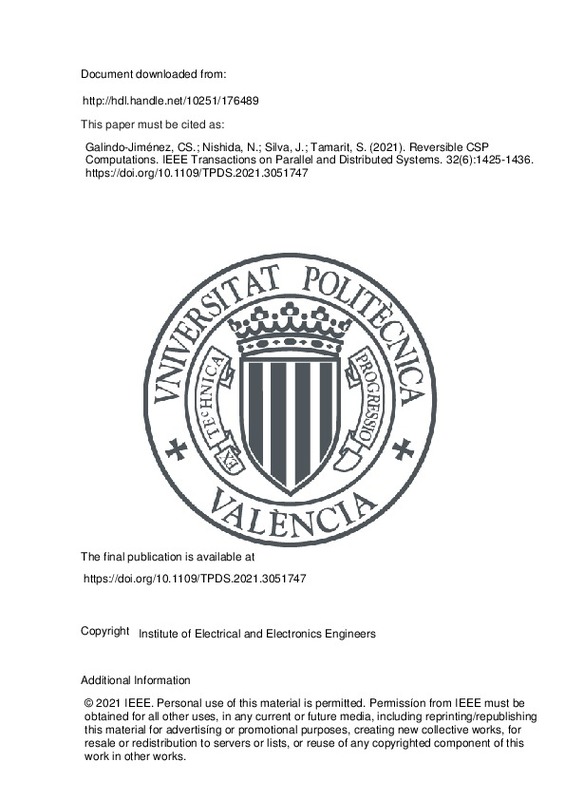Galindo-Jiménez, CS.; Nishida, N.; Silva, J.; Tamarit, S. (2021). Reversible CSP Computations. IEEE Transactions on Parallel and Distributed Systems. 32(6):1425-1436. https://doi.org/10.1109/TPDS.2021.3051747
Por favor, use este identificador para citar o enlazar este ítem: http://hdl.handle.net/10251/176489
|
Título:
|
Reversible CSP Computations
|
|
Autor:
|

 Galindo-Jiménez, Carlos Santiago
Nishida, Naoki
Galindo-Jiménez, Carlos Santiago
Nishida, Naoki

 Silva, Josep
Tamarit, Salvador
Silva, Josep
Tamarit, Salvador
|
|
Entidad UPV:
|
Universitat Politècnica de València. Departamento de Sistemas Informáticos y Computación - Departament de Sistemes Informàtics i Computació
|
|
Fecha difusión:
|
|
|
Resumen:
|
[EN] Reversibility enables a program to be executed both forwards and backwards. This ability allows programmers to backtrack the execution to a previous state. This is essential if the computation is not deterministic ...[+]
[EN] Reversibility enables a program to be executed both forwards and backwards. This ability allows programmers to backtrack the execution to a previous state. This is essential if the computation is not deterministic because re-running the program forwards may not lead to that state of interest. Reversibility of sequential programs has been well studied and a strong theoretical basis exists. Contrarily, reversibility of concurrent programs is still very young, especially in the practical side. For instance, in the particular case of the Communicating Sequential Processes (CSP) language, reversibility is practically missing. In this article, we present a new technique, including its formal definition and its implementation, to reverse CSP computations. Most of the ideas presented can be directly applied to other concurrent specification languages such as Promela or CCS, but we center the discussion and the implementation on CSP. The technique proposes different forms of reversibility, including strict reversibility and causal-consistent reversibility. On the practical side, we provide an implementation of a system to reverse CSP computations that is able to highlight the source code that is being executed in each forwards/backwards computation step, and that has been optimized to be scalable to real systems.
[-]
|
|
Palabras clave:
|
Concurrent programming
,
Tracing
,
Debugging aids
,
Code inspections and walkthroughs
|
|
Derechos de uso:
|
Reserva de todos los derechos
|
|
Fuente:
|
IEEE Transactions on Parallel and Distributed Systems. (issn:
1045-9219
)
|
|
DOI:
|
10.1109/TPDS.2021.3051747
|
|
Editorial:
|
Institute of Electrical and Electronics Engineers
|
|
Versión del editor:
|
https://doi.org/10.1109/TPDS.2021.3051747
|
|
Código del Proyecto:
|
info:eu-repo/grantAgreement/AEI/Plan Estatal de Investigación Científica y Técnica y de Innovación 2017-2020/PID2019-104735RB-C41/ES/SAFER-UPV: ANALISIS Y VALIDACION DE SOFTWARE Y RECURSOS WEB/
info:eu-repo/grantAgreement/JSPS//JP17H01722/
info:eu-repo/grantAgreement/EC/H2020/952215/EU/Foundations of Trustworthy AI - Integrating Reasoning, Learning and Optimization/
info:eu-repo/grantAgreement/AEI//TIN2016-76843-C4-1-R//METODOS RIGUROSOS PARA EL INTERNET DEL FUTURO/
info:eu-repo/grantAgreement/GENERALITAT VALENCIANA//PROMETEO%2F2019%2F098//DEEPTRUST/
|
|
Descripción:
|
© 2021 IEEE. Personal use of this material is permitted. Permissíon from IEEE must be obtained for all other uses, in any current or future media, including reprinting/republishing this material for advertisíng or promotional purposes, creating new collective works, for resale or redistribution to servers or lists, or reuse of any copyrighted component of this work in other works.
|
|
Agradecimientos:
|
A preliminary version of this work was presented at the 12th Conference on Reversible Computation [31]. The authors would like to thank the anonymous reviewers for their useful comments and constructive feedback that helped ...[+]
A preliminary version of this work was presented at the 12th Conference on Reversible Computation [31]. The authors would like to thank the anonymous reviewers for their useful comments and constructive feedback that helped them to improve this work. This work was supported in part by the EU (FEDER) and the Spanish MCI/AEI under Grant TIN2016-76843-C4-1-R and Grant PID2019-104735RB-C41, in part by the Generalitat Valenciana under Grant Prometeo/2019/098 (DeepTrust), in part by JSPS KAKENHI under Grant JP17H01722, and in part by TAILOR, a project funded by EU Horizon 2020 research and innovation programme under GA 952215.
[-]
|
|
Tipo:
|
Artículo
|







![[Cerrado]](/themes/UPV/images/candado.png)


